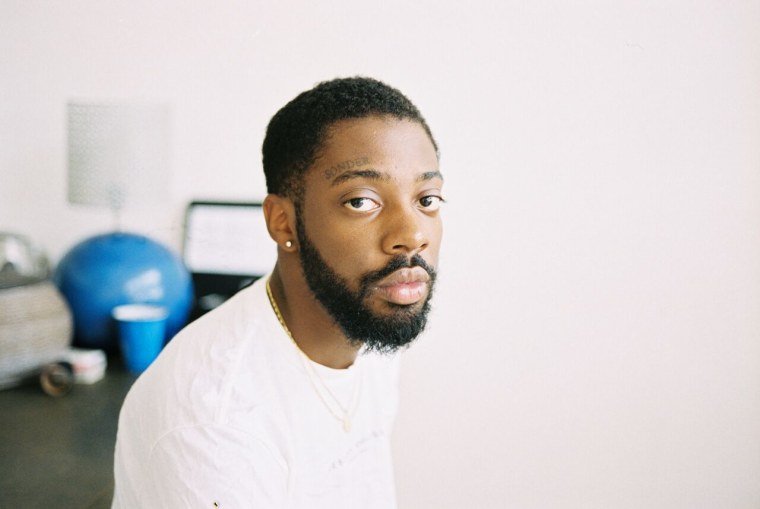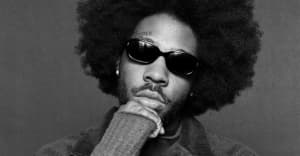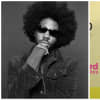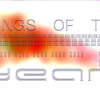 Mark Placed
/
Courtesy of Brent Faiyaz
Mark Placed
/
Courtesy of Brent Faiyaz
Brent Faiyaz was a rapper before he ever thought about singing. “I hit a certain age and it seemed like singing wasn’t cool,” the 22-year-old told me over the phone from his adopted home of L.A. “It took a while for me to bring myself to do it because it wasn’t fly to me.”
In the past three years, some of Columbia, Maryland native’s most notable achievements have been the result of collaboration. Earlier this year, he formed the band Sonder with producers Atu and Dpat to release their Into EP, and he showed up for a scene-stealing hook on GoldLink’s single “Crew.” These accomplishments have led him to the current moment: the release of his debut album Sonder Son, which is out today. The album is a personal collection of songs that gives the listener a vivid snapshots of Faiyaz’s life up to this point, from skipping school in Maryland to dreamchasing in L.A.
During our conversation, Brent Faiyaz discussed recording Sonder Son in the Dominican Republic, the current state of R&B, and why it’s cool to be vulnerable.
You just wrapped up the first Sonder tour with Dpat and Atu. How did y’all decide to form the group?
I linked up with Dpat and Atu after they heard one of my records on SoundCloud and reached out to do a remix. Then they came to L.A. to do a show, we got in the studio, and pretty much went from there. We went to Atu’s apartment in Orlando and cut the Into project in like a week. It was all real organic.
We started the band because we couldn’t just be like, “Brent and Dpat and Atu drop a project.” We got the name from the tattoo above my eye. At first I was like, “Nah, I’m not naming it that. I just met y’all niggas, and I got it tatted on my face. What if we start beefing?” But we cool.
Why did you decide to get that word tatted on your face originally?
Sonder is the realization that every individual passerby has their own life just as vivid and complex as yours. Everybody you walk past and communicate with and interact with got their own shit going on. It made a lot of sense for how we met and how the whole thing came together.
How do you approach working in the group differently than when you’re working on your own music?
If I’m working with Sonder, I pay more attention to how they react to it. If we’re playing a beat, and I’m writing on it, I’ll be playing with different melodies and cadences and I’ll be looking at their physical reactions. How Dpat face looks or the face that Atu makes — that’s how I know which way to go. When you collaborate you want to make sure that everybody likes it. Solo shit is a lot more personal. I can be the only one that likes it, and if I like it, I’m like, Fuck it.
“Crew” has been one of the biggest moments in your career so far. How did that track come together?
Me and Goldlink have known of each other for a minute and our managers know each other so they set up a studio session. When we got in the studio, we was cool; we’re from the same area so we have a lot in common. That originally wasn’t supposed to be the hook on “Crew.” I was starting the first verse, and I couldn’t finish it. Then [Goldlink] went in there and did his part. When I found out they made that shit the hook, I was kinda mad. But they sent it back with Shy Glizzy on there and it was hard.
You start off Sonder Son with a skit of your mom yelling at you over a report card. Why’d you choose to open the album that way?
It’s funny because when I was thinking of concepts for the album, I was gonna start it out with my life currently in L.A. But if I was going to make a personal album, I couldn’t be skipping shit from early on. I had to think back and reflect — it’s a lot easier to write about in retrospect. There’s a lot of shit I wanted to talk about, but I didn’t want to preach at niggas without them knowing who I am. It doesn’t work that way. In order for people to take what you say seriously, they have to know who you are as a person.
The album does end up going from those early experiences to the present and your life in L.A. Did you record the album out there?
I started the recording process in L.A., but we ended up going to the Dominican Republic for a month in July and that’s where we cut most of the project. My family is from the Dominican Republic, on my dad’s side, and I’d never been there, so I figured it would bring some different energy out.
It was maybe nine of us; we had a big ass crib and we just recorded and swam. Niggas tended to wake up pretty early, eat, bullshit, and then start recording. But we were also staying in the hood, and we’d drive 15 minutes and be where everything was at. I didn’t find out until I came back that I still have family in Santo Domingo.
It seems like there’s been an emphasis in R&B on being enigmatic, but you’re putting yourself out there with this album.
I think if you’re an interesting person, you don’t have to cloud yourself in mystery for people to want to know more about you. If you really got some shit to say, you can talk for hours and hours and people will still listen to you. I didn’t grow up singing, so I feel like I’m approaching this more like a rapper. I’m not gonna hold my tongue when it comes to how I feel about anything.
People get so caught up in the studio shit that they forget they actually have a voice and platform to say some real shit if they want to. Nowadays, a lot of artists take the easy way. It’s like who can be the youngest and give less fucks than the next person. That’s kinda weak to me. The more opinionated people are, and the more they show themselves as individuals, the more they feel like people can critique them. It’s one thing to have people not like your music and talk shit, but it’s another thing to be yourself, and look how you look, and talk how you talk, and have people critique that. It’s easy to be a mystery but it’s hard to be vulnerable.


